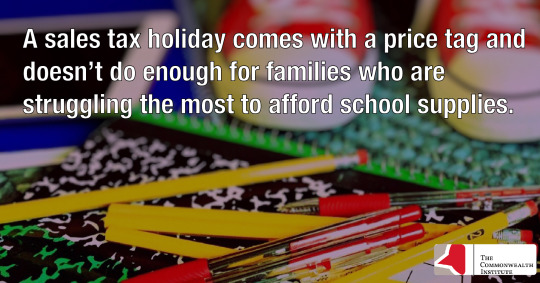August 2, 2018
The Cost of Sales Tax Holidays
This coming weekend is Virginia’s annual “sales tax holiday.” Although sales tax holidays are pitched as a way to help families on back-to-school shopping, this policy provides little help to families who are most struggling to afford school supplies. Like other tax breaks, the cost of the sales tax holiday has to be made up somewhere in the state budget – either in the form of lower spending or higher taxes. And this one comes with a serious price tag of about $4.6 million per year in forgone state revenue – revenue that could be used to invest in schools.
Designed to coincide with back-to-school shopping, Virginia’s three-day event allows consumers to purchase qualifying items without having to pay sales tax. For this year, the list of tax-exempt items includes select school supplies, clothing, footwear, hurricane and emergency preparedness items, and energy- and water-efficient products.
Among its many problems, the tax holiday doesn’t provide enough help to those families most likely to have trouble affording school supplies. Because the tax holiday takes place during a short time period, it’s wealthier families who are best positioned to shift the timing of their purchases to take advantage of the savings. For lower-income families who are struggling to make ends meet, this is not as often the case. That means families who are having the most trouble affording back-to-school clothing and supplies often see little or no benefit from sales tax holidays, while higher-income families catch a break they don’t need as much. The timing effect is also a reason why sales tax holidays haven’t been shown to boost overall retail sales or spur economic growth. Many of the purchases would have occurred in the absence of the sales tax holiday.
And once families get to the register, the amount of savings might be lower than expected. Research suggests that many retailers either increase their prices or reduce their sales pricing during tax holidays.

It’s true the combined cost of school supplies and activity fees have increased in recent years. However, a three-day sales tax holiday does little to directly address this problem. The tax exemption applies regardless of the reason for the purchase. And because it excludes items like cleats and shin guards, which could help address barriers that keep students from participating in social development activities, the list of qualifying items raises questions about the purpose of the event.
If Virginia was serious about more directly helping families with back-to-school spending, it could boost state support for K-12 education so that parents (and teachers) are not asked to pay out of pocket for basic supplies that used to be provided by the schools themselves. Local schools are faced with real challenges – inflation-adjusted state support for Virginia’s schools is down 9.1 percent per student compared to 10 years ago. Instead of a poorly targeted policy like a sales tax holiday, Virginia could try to return to more adequately funding K-12 schools.
Category:
Budget & Revenue
